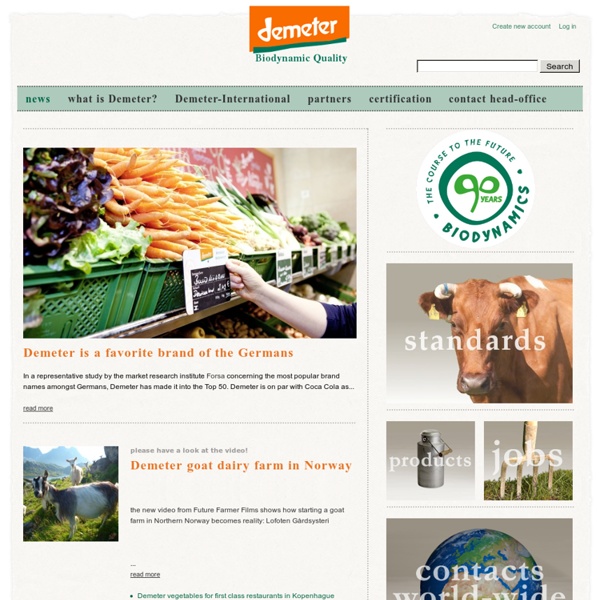



Concoctez vos mélanges d’épices ayurvédiques Les épices ont toujours fait aussi bien partie de la cuisine que de la médecine indienne. Voyons ensemble comment nous pouvons concocter aisément des mélanges aromatiques adaptés à notre constitution et à nos besoins du moment, tout en titillant agréablement nos papilles. Dans l’article « Alimentation et Ayurvéda », publié précédemment, nous avons abordé le concept des trois doshas, soit vata, pitta et kapha. Ce sont trois paramètres utilisés en Ayurvéda, la médecine traditionnelle indienne, pour décrire l’état de santé d’un individu et l’impact du mode de vie et de l’alimentation sur l’équilibre du corps humain. En identifiant quel dosha est le moins équilibré en nous, on peut choisir un mélange d’épices et d’aromates. Celui-ci aura une influence bénéfique sur notre bien-être et notre état de santé en adaptant vos plats à votre constitution personnelle.
Label Demeter Un article de Wikipédia, l'encyclopédie libre. La marque Demeter est une marque de certification de produits issus de l'agriculture biodynamique, selon les enseignements de Rudolf Steiner. Les produits Demeter respectent le cahier des charges du règlement européen sur l'agriculture biologique. Historique[modifier | modifier le code] Plats - Began ka bharta… - Cuisine indienne… - Recette Burger… - Le daal recette… - Cuisine… - Brochettes de Tofu… - Recette indienne… - Recette indienne… Lundi 1 février 2010 1 01 /02 /Fév /2010 07:00 Bonjour et bienvenue dans mon blog cuisine. Aujourd'hui nous allons cuisiner des Gombos, qu'on appelle aussi Bhindi en Hindi (ou Okra ou lady's fingers). Il existe plusieurs recettes pour préparer les bhindis ; nous allons commencer avec la plus simple. Je vous présente la boîte à épices indiennes traditionnelle, le Masala dani, dans laquelle on trouve la coriandre, le curcuma, le piment, la moutarde, la cardamome, les clous de girofle et le sel.
S’initier à l’agroécologie : mode d'emploi - Transition Avis aux jardiniers en herbe, aux paysans et aux citoyens curieux : cet été, Basta ! vous initie à l’agroécologie. Ou comment apprendre à se passer de pesticides, à dépenser beaucoup moins d’eau, à planter en hiver sans chauffer ses serres, à semer sans payer de redevances à l’agrobusiness, tout en produisant ce que l’on souhaite pour se nourrir. Visitez avec nous la ferme expérimentale de l’association Terre et Humanisme, installée au cœur de l’Ardèche, véritable laboratoire des techniques agroécologiques. 10 écogestes insolites pour un potager qui a la patate Extrait de Néoplanète 29 On connaît déjà toutes les astuces classiques pour un jardin respectueux de l’environnement. Mais si on se lâchait un peu, cette année ?
Enquête sur la coloration dite "végétale" : attention aux ingrédients ! La coloration dite végétale est une pratique qui séduit de plus en plus de femmes. Face à cet engouement, la rédaction a mené son enquête sur tous ces produits estampillés naturels qui nous promettent monts et merveilles. Sont-ils réellement à la hauteur de nos exigences, tout en préservant notre santé ? Purifier sa maison avec des plantes dépolluantes L’atmosphère dans une maison renferme une infinité de parasites souvent indécelables à l'oeil nu qui peuvent nuire à la santé de ses occupants. Afin d’y remédier, l’adoption des plantes dépolluantes s’avère être une solution efficace. Ces dernières ont pour rôle principal de purifier l’air dans une maison en aspirant certains produits chimiques. Ces impuretés peuvent être des solvants, des produits de nettoyages, des substances allergènes et d'autres polluants qu'on peut retrouver dans les produits chimiques. Par ailleurs, les sources de pollution sont surtout les produits qui contiennent des composés organiques volatiles très présents dans notre entourage à l'exemple des meubles en contreplaqué, les détergents, les plastiques ainsi que les ondes électromagnétiques.
Les fleurs comestibles du jardin Fleurs | 03/05/2013 Profiter des fleurs du jardin produites naturellement (non traitées) pour accompagner les petits plats en cuisine, en voilà une bonne idée ! En décoration, en vinaigre ou en infusion, osez manger les fleurs du jardin et apprenez quand les semer, les récolter et les cuisiner.
Associer légumes, plantes et fleurs contre les maladies et les parasites Accueil > Articles > Fleurs > Associer légumes, plantes et fleurs contre les maladies et les parasites Fleurs | 06/03/2014 Légumes, fleurs et aromatiques se rendent service. Ils éloignent des parasites ou semblent favoriser la production de leurs voisins. En les regroupant, vous profiterez de leur bonne entente et limiterez les traitements.
Potager de poche : jardiner en miniature Légumes et potager | 02/03/2013 Avec un potager surélevé de 1 à 3 m2, le but n'est pas de nourrir une famille à longueur d'année, mais de prendre plaisir à jardiner, d'agrémenter ses repas, et de se dépanner lorsque l'on n'a pas le temps de faire les courses. F.Marre - Rustica - Jardin de Marie-Ange Surélevé, le potager est plus facile à ordonner, car l’avoir à portée des yeux et des mains oblige à une gestion parfaite. Rotation des cultures, bonnes associations, esthétique, rien n’est laissé au hasard. Il devient décor à part entière du jardin, contribue à son architecture et permet de marier le beau et le gourmand ! Un jardin potager au balcon Légumes et potager | 30/05/2013 Pratique, la jardinière d’aromatiques à portée de main ! Sympa, les petites tomates à grappiller à l’heure de l’apéritif… Tous les légumes ne se prêtent pas à la culture en pot, mais bien choisis, ils offrent de belles récoltes. Cultiver des légumes au balcon, voire sur un rebord de fenêtre, est à la portée de tous. Une solution au manque de jardin. - F.
Découvrez notre série d'exercices de méditation au quotidien Ces exercices de méditation au quotidien vous aideront à améliorer votre bien-être tout au long de la journée La méditation peut prendre bien des formes. Si vous voulez l’intégrer dans votre vie quotidienne, si la pratique à heure déterminée n’est pas possible ou qu’elle ne vous suffit pas, pratiquez les exercices de méditation régulièrement. À partir de tous ces petits riens que vous rencontrez, vous allez apprendre à méditer de plus en plus profondément.